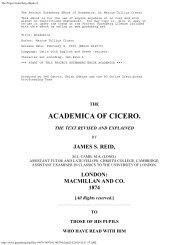From Farm House to the White House - 912 Freedom Library
From Farm House to the White House - 912 Freedom Library
From Farm House to the White House - 912 Freedom Library
You also want an ePaper? Increase the reach of your titles
YUMPU automatically turns print PDFs into web optimized ePapers that Google loves.
<strong>Farm</strong> <strong>House</strong> <strong>to</strong> <strong>the</strong> <strong>White</strong> <strong>House</strong>, by William M. Thayer 37<br />
"Play not <strong>the</strong> peacock, looking everywhere about you <strong>to</strong> see if you be well-decked; if your shoes fit well; if<br />
your pantaloons sit neatly, and clo<strong>the</strong>s handsomely.<br />
"Let your conversation be without malice or envy, for it is a sign of a kindly and commendable nature; and in<br />
all cases of passion, admit reason <strong>to</strong> govern.<br />
"Utter not base and frivolous things amongst grave and learned men, nor very difficult questions or subjects<br />
among <strong>the</strong> ignorant, nor things hard <strong>to</strong> believe."<br />
These are only a part of <strong>the</strong> Rules which George adopted for his instruction and guidance through life. In<br />
weighing <strong>the</strong>m, <strong>the</strong> reader must feel <strong>the</strong> force of Everett's remarks, who said of <strong>the</strong>m, "Among his manuscripts<br />
still in existence, <strong>the</strong>re is one, written under thirteen years of age, which deserves <strong>to</strong> be mentioned as<br />
containing striking indications of early maturity. The piece referred <strong>to</strong> is entitled 'Rules of Behavior in<br />
Company and Conversation.' These rules are written out in <strong>the</strong> form of maxims, <strong>to</strong> <strong>the</strong> number of one hundred<br />
and ten." "They form," says Mr. Sparks, "a minute code of regulations for building up <strong>the</strong> habits of morals and<br />
manners and good conduct in very young persons." Whe<strong>the</strong>r <strong>the</strong>y were taken in a body from some manual of<br />
education, or compiled by Washing<strong>to</strong>n himself from various books, or framed from his own youthful<br />
observation and reflection, is unknown. The first is, perhaps, <strong>the</strong> more probable supposition. If compiled by a<br />
lad under thirteen, and still more, if <strong>the</strong> fruit of his own meditations, <strong>the</strong>y would constitute a most<br />
extraordinary example of early prudence and thoughtfulness. Some of <strong>the</strong> rules which form a part of this<br />
youthful code of manners and morals had <strong>the</strong>ir influence over Washing<strong>to</strong>n, and gave a complexion <strong>to</strong> his<br />
habits through life.<br />
That a boy of twelve or thirteen years should compile such a code of manners and morals, shows,<br />
unmistakably, <strong>the</strong> bent of his mind. We discover valuable elements of character in <strong>the</strong> formation and<br />
execution of such a purpose. It is equally true, also, that his book of prose and poetical extracts reveals his<br />
taste and aims no less surely than his "Rules." The following extract, taken from that manuscript volume, tells<br />
about <strong>the</strong> same s<strong>to</strong>ry of <strong>the</strong> boy as his "Rules of Behavior" tell:--<br />
"These are <strong>the</strong> things, which, once possessed, Will make a life that's truly blest; A good estate on healthy soil,<br />
Not got by vice, nor yet by <strong>to</strong>il; Round a warm fire a pleasant joke, With chimney ever free from smoke; A<br />
strength entire, a sparkling bowl, A quiet wife, a quiet soul; A mind, as well as body, whole; Prudent<br />
simplicity, constant friends, A diet which no art commends, A merry night without much drinking, A happy<br />
thought without much thinking. Each night by quiet sleep made short, A will <strong>to</strong> be but what thou art:<br />
Possessed of <strong>the</strong>se, all else defy, And nei<strong>the</strong>r wish nor fear <strong>to</strong> die; These are <strong>the</strong> things, which, once<br />
possessed, Will make a life that's truly blest."<br />
His strong love for simple, pure, domestic life appears in this selection--a love for which he was distinguished<br />
<strong>to</strong> <strong>the</strong> day of his death.<br />
The school-days of George ended one month before he was sixteen years of age. Mr. Hobby and Mr. Williams<br />
were his only teachers, except his parents. "Not very rare opportunities," <strong>the</strong> reader will say. No larger<br />
opportunities for mental culture now would be considered meagre indeed. But he made <strong>the</strong> most of what he<br />
had, so that his small advantages did more for him than <strong>the</strong> best opportunities do for less industrious and<br />
noble boys.<br />
A strong bond united him <strong>to</strong> his teacher and schoolmates. It was not so much his scholarship as his character<br />
that endeared him <strong>to</strong> both teacher and pupils. The secret of it was found in his heart ra<strong>the</strong>r than his head. His<br />
school-mates were moved <strong>to</strong> tears on parting with him, and so was his teacher. And those tears were a sincere<br />
tribute <strong>to</strong> <strong>the</strong> unsullied character of <strong>the</strong> boy.<br />
V.















